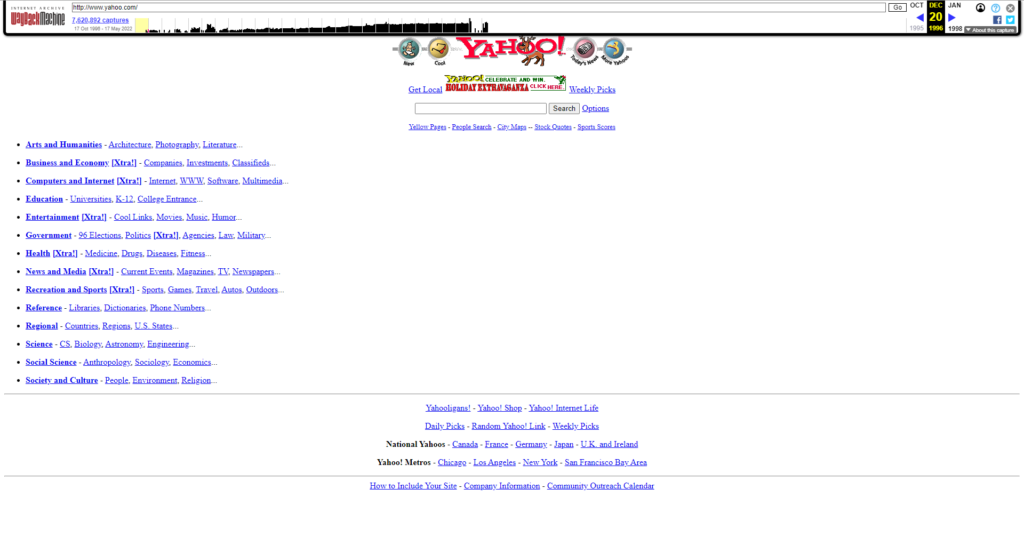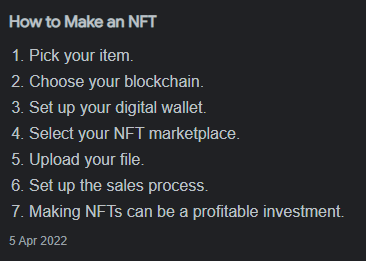
What is WEB3?
I was sent a project outline at work which was talking about blockchain and it occurred to me that not everyone has grown up with the different versions of the web. I figured I would give a super brief overview of the different generations that the web has gone through;
Web 1
This was the original consumer grade internet. Static webpages with little to no functionality, this was more akin to reading a pamphlet than the web we know and recognise now. Here’s a few examples;



This was the web that relied on 56Kb modems, screaming their siren song at you every time you connected to AOL, with advertisements for services the world over. Web pages were (for the most part) just pages of text – it was purely for people to consume, and creation of your own webpage or forum was nowhere near as easy as it is today. This was the timeframe of the dot com bubble.
Web 2
This is the web space we know today – around 2004, webpages started to not just send information to you, but started to gather information from you. They would capture name, location, email address and even bank details. Google, Facebook and Amazon were birthed in this along with most current tech giants.
This is when it became commonplace for all of these large companies to sell data to advertisers, leading to *targeted* advertisements – now you could be served ads for your local gym rather than a bakery in another country.
Towards the end of the Web 2 generation, there started to be implemented laws surrounding what could and could not be captured, such as GDPR and CCPA.
Web 3.0
Web3 is the latest envisioning of the internet – Built on the blockchain, with a heavy focus on decentralisation. Benefits include;
- Truly owning your own data and assets
- Decentralisation avoids censorship – China, Cuba, Syria and Iran block online information and decentralised domains are a way around this.
- Anonymity – The biggest selling point of Web 3
There are however a mountain of issues with Web 3.
The end goal of Web3 is that you have a single public ‘crypto wallet’ that defines you as an individual. Every purchase you have ever made, every twitter post, every asset you currently own. A record of every time you have logged into a Web 3 based site or app, your monthly paycheque… Any NFTs you have purchased…
You may see the big issue here and why so many rally against this. Whilst your name may not be connected directly to the wallet, anyone you interact with will know everything about you. *Everything*.
And when one of the tech giants moves to Web 3 – an inevitable eventuality – they will be able to target ads that much easier. They now have a complete history of every purchase made – What events did you buy NFT tickets for? How many tickets? Which wallets did you send those tickets to? What location are you in?
And that’s the thing; those staring the benefits of ‘anonymity’ have missed that it’s not anonymous, it’s just that the human has been stripped out. While Web 2 tries to reduce you to data that could be fit into a spreadsheet for the purpose of selling that data to advertisers, Web 3 does it by design.
And the issues run deeper than that. Let’s say that I am Patrick Bateman and I want to track you down for some nefarious deeds. There is a live feed online from your wallet, so if you order from Justeat? I know you’re home. You pay for a drink at Wetherspoons? I know where you are. You tap in at the gym? You drop a FB message? You send a private selfie to a friend? I now have access to it.
The data is all recorded and streamed live. Every moment of every day, every purchase, your current bank balance and every 3AM post-drinks infomercial impulse buy. Every psychometric test you’ve ever done just for fun, every job application, every pharmacy subscription, it’s all available 24/7 to whoever wants it.
NFTs
So the biggest current outcry about Web3 is NFTs – Non-fungible tokens – and I have touched on them before, but here’s the thing; You can mint an NFT in about 5 minutes.

Let’s say that a disgruntled ex partner has some risqué pictures of you. In about 5 minutes, they can mint those and send them to your public wallet. You have no way to accept or decline the transaction, you just get them. Anyone who views your wallet going forwards is able to see those pictures of you.
Because the technology is decentralised, those pictures will be there forever. You can pass them to a burner wallet, but there will be a record of you receiving and passing those pictures on, so the reference will forever be attached to your public wallet, making it irreversible and un-moderatable harassment.
What if instead of that, I send them to your workplace’s wallet? If there is a monthly income from one wallet, sickos can just send the NFTs to that and now everyone you work with can see them, everyone who deals with the company can see them, etc.
DAOs
One of the other ideas brought up by Web3 is the concept of Decentralised Autonomous Organisations – DAOs – A company that is coded. It runs itself, pays out its employees, and does pretty much everything automatically. They claim to be member-owned communities without centralized leadership, which sounds great, but to date there has been no DAO that has seen any measure of success.
Why? Because if you code a company, someone will hack it. And when they do, because of how the blockchain works, you’re on your own. Think I’m scaremongering here? Let’s take a look at a company called ‘The DAO‘.
The DAO was a decentralized autonomous organization that existed as a set of contracts that resides on the Ethereum blockchain. On June 17 2016 – less than 3 months after starting operations – the DAO was subjected to an attack exploiting a combination of vulnerabilities, including concerning recursive calls, that resulted in the transfer of 3.6 million Ether – valued at the time at around $50M.
I can see plenty of potential in this – I would happily work in a worker owned cooperative, but the fact that DAOs are so vulnerable in this way makes that an improbability at this time.
Conclusion
Web3 is popular right now because it’s effectively an online tax haven. Everything that *is* traceable isn’t traceable to you *right now*. This of course changes as soon as anything identifiable happens and then all of those benefits are gone. Lend a friend £10? Boom, they can now see everything you have purchased, legally, illegally, whatever. Start a business and put in £100 seed money? Boom, identifiable, Purchase something online and *that company* gets compromised? There’s your anonymity gone.
The application of technology should ideally make things better, not worse. All of these technologies are cool but people aren’t thinking about the ramifications of having everything so open. It’s sad to find that Web3 is dying so quickly as it’s still in its infancy, but with so many problems seen so quickly by so many, it is difficult to imagine it going anywhere until the issues are addressed.